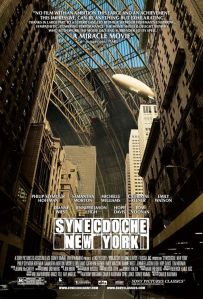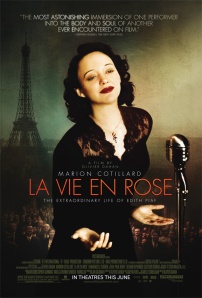Film:
Synecdoche, New York, 2008
Staring Philip Seymour Hoffman, Catherine Keener, Samantha Morton, Michelle Williams, Emily Watson, Dianne Wiest, and Jennifer Jason Leigh.
Synopsis (from NetFlix):
After his painter wife (Catherine Keener) leaves him and takes their daughter to Berlin, theater director Caden Cotard (Philip Seymour Hoffman) stages an autobiographical play in a massive New York City warehouse amid a life-size replica of Manhattan. Meanwhile, Caden must contend with the many women in his life — including a box-office worker, an actress and a shrink — in this beguiling directorial debut from screenwriter Charlie Kaufman.
My Thoughts:
This movie has been in the recommended queue for over a year and I am finally getting to it. I apologize for the delay, it’s been a crazy year, and I know it’s the type of film that requires due process. It’s the type of film that makes you think, and makes you feel. But not comfortable feelings. Incredibly frustratingly uncomfortable, painful feelings. I like films like this, that force you to wrestle with this side of life but I do not enjoy films like this. Let me elucidate that paradox a little.
Film is a medium, and as such it is not always used for entertainment and pleasure, even if that is the predominant trend. Film can be used as a tool for communication, for meditation, or exploration. I love it when movies use all the power film has to offer as an art form by working the visuals, and pushing the boundaries to actually show you something rather than tell you. This movie does that. However what it shows is frankly unpleasant. It does it really well, but it’s painful. It helps you to experience the pain and suffering of the main character by getting so lost in him, and his meta existence so as to trick you into feeling that (if you are highly empathetic like myself). If you like films like Lost in Translation or Magnolia then you will like this movie, but it’s even more extreme. Ok, with that lengthy introduction let me actually get to the content of the film.
The film begins like a typical independent film starring Philip Seymour Hoffman. He’s made a lot of them and if you’ve seen even one you have a feel for it. As it opens, it’s gritty and has that look to it. I think Kaufman wants to trick the audience into complacency because as it goes on characters start breaking unwritten rules. They do not react how you expect them to, they do not react in the way society dictates is normal.
What is clear from the beginning is that Caden Cotard is lonely, unhappy, and ill, and throughout the film this state increases. Nobody can help him, even when he asks for it. His family abandons him. His doctors shuffle him around not solving the problem. His therapist just tries to sell him books.
What oppression is more grievous than that a soul seeking the truth, and wishing to attain unto the knowledge of God, should know not where to go for it and from whom to seek it? – Bahá’u’lláh
Cotard has no clue, and so he pours himself into his art. Art can be a wonderful thing. It can uplift the soul. It can increase knowledge. But what Cotard does is essentially use his art for his ego. He wins this prestigious MacArthur genius grant right when his life is falling apart and thinks it can redeem him. Instead his play becomes him playing God and recreating his life over and over again, getting deeper and deeper into himself and his neuroses and it doesn’t work. He finds no solace. He finds no audience. He finds no answers.
Cast away, O people, the things ye have composed with the pen of your idle fancies and vain imaginings … Idle fancies have debarred men from the Horizon of Certitude, and vain imaginings withheld them from the Choice Sealed Wine. – Bahá’u’lláh
Instead decades go by, he ages as he suffers and as his relationships disintegrate more and more due to his inability to view the world outside of himself and outside of his pain. He becomes completely self centered. There is a glimmer of hope near the end when he and Hazel finally work out there issues, and she states what may seem like a throw away line, but I think reaches at the heart of the matter about how it was the first time she’d seen him think about someone other than himself.
And finally the true ending when he is too tired of all his directing and decides to play another role, to step into another person’s life. It is here that he can see that another has pain, another disappointment, and he can finally find comfort in feeling for another, rather than himself.
Millicent Weems: What was once before you – an exciting, mysterious future – is now behind you. Lived; understood; disappointing. You realize you are not special. You have struggled into existence, and are now slipping silently out of it. This is everyone’s experience. Every single one. The specifics hardly matter. Everyone’s everyone. So you are Adele, Hazel, Claire, Olive. You are Ellen. All her meager sadnesses are yours; all her loneliness; the gray, straw-like hair; her red raw hands. It’s yours. It is time for you to understand this.
– From the film
And I think this is why I had such a problem with the film, why it did not sit well with me, and that’s because this is a half truth. It reaches the culmination of understanding that we are all connected, that we are all unified and we need to get over the ego of self, but it only focuses on the negative, on the disintegration. This is everyone’s experience, but not everyone’s complete experience and because of this it is bleak.
Where is joy? Where is beauty? Where is love? Where is God? The word was only first mentioned an hour into the film in passing, and then indirectly and derogatorily by Hazel “We send the kids to Christian school. It’s Derek’s idea, I don’t believe in that stuff”, and then in the end at a funeral when a priest preaches pretty much the exact opposite message that a cleric would. This is a world without God, without religion (in the true sense of the word), and it shows. It shows in all the social dysfunction and ill portrayed in the film. People are amoral. They abandon each other. They use one another. They cause each other suffering. If this is everyone’s experience than what are we all doing wrong for it to be this horrid?
Some people argue that this is the world as it is, and on some level they are right. People have abandoned the teachings of the great faiths, have stopped fearing God, stopped loving God, and stopped following God and in doing so have created even more pain and suffering. They have corrupted many forms of religion and turned them into self-serving political machines, or an isolationist club, in the image of themselves instead of God’s so that even labeling oneself religious does not necessarily free you from this Kaufmanesque view of the world.
Instead if we distill the message from the major faiths it is this: Love. Put others before yourself. Humble yourself. Be compassionate. Show this love through deeds. Love everyone, even the people you don’t like, nay, especially the people you don’t like because it’s not about you, and it’s not about your opinion. They probably need the love even more so.
We can hardly blame Cotard because he was not shown love so he could not really learn how to love. He is constantly looking for someone to follow, but has no adequate model. However, this is why we have the examples of Buddha, of Jesus, of Baha’u’llah and Abdu’l Baha. They show us what true selfless love can be so we can follow there model, so that the world won’t devolve into Synecdoche, New York.
synecdoche |siˈnekdəkē|
noun
a figure of speech in which a part is made to represent the whole or vice versa, as in Cleveland won by six runs (meaning “Cleveland’s baseball team”).-from the Apple dictionary.
In this case of this film Caden Cotard represented the whole. Let’s change that. Let’s make it one of these great teachers, who shows us how to love, and how to suffer with grace instead of despair.



